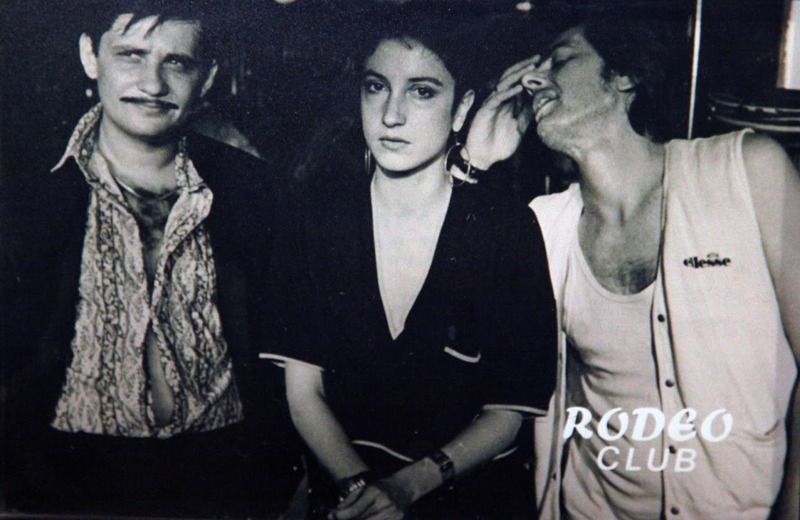Since this week I’ve already set my mind on covering
the Greek speaking Rockers of my generation, it is already one day too late to strat but it is never too late... Artists that put their brand in
the local scene with legendary stories, some of them probably well-known and
abroad. This 3 day back to back suggestions brings u Greece’s finest, speaking
the native tongue and performing something of a classical US kind of blues rock (for
today), something of elementary rock infused with artistic addition (such as
lyrics taken from poems, sounds imitating mainstream international music with
extensive use of keyboards for tomorrow) and the most original of this lot, a
genuine replica of brit new wave post-punk sounds and founding bands (e.g. early
Cure for Wednesday) with Greek subversive lyrics and ultimately an independent
and exploring rock sound that still endures and referred to as classic and an
endless fountain of inspiration (as far as Greek speaking Rock concerns…)
Taking as staring point the sad occasion of Greek’s
primary Rock heroes and true advocate of sex drugs & rock’ n roll dogma
demise @ 06/12/1990 and before switching it to Greek it’s nice to state
something in UK first (as noted in wiki): « Pavlos Sidiropoulos (Greek: Παύλος Σιδηρόπουλος; July
27, 1948 – December 6, 1990) was a Greek musician, noted for supporting the use
of Greek lyrics
in rock music, at a
time when most Greek rock groups were
using English lyrics. Pavlos Sidiropoulos was born on 27 July 1948 in Athens in
a wealthy family. His father Kostas has been raised in a known family of
merchants from Pontos and he owned the paper production company ELFOT, however
politically was a supporter of the left. His mother Jenny was granddaughter of George Zorbas (the
real person behind the novel Alexis Zorbas of Nikos Kazantzakis. He was
also nephew of writer Elli Alexiou and poet
Galatea Kazantzaki who was
the first wife of Nikos Kazantzakis.
 |
| Meeting Of The Giants: Pilali/Christy/Paul |
Sidiropoulos began his career in 1970 in Thessaloniki, where he was studying
maths. Together with Pantelis Delleyannidis he founded the rock group
“Damon and Phintias”. A song of that era
(“Clown”) later came out in the album “Zorba the Freak”. He never finished his
studies, and he returned to Athens, disappointed by the revolutionary youth of
Thessaloniki at the time, where he worked to his father's factory. They soon
met, at "Kittaro" the Greek musician Dionysis Savvopoulos and his group “Bourboulia”. They joined that group and participated in
the album “Damis the tough” (Greek: Ντάμης ο σκληρός). They stayed in this
group for two years until 1974. It was through this group that Sidiropoulos
first experimented with combining Greek and rock music.
Afterward Sidiropoulos collaborated with the Greek composer Yannis Markopoulos: he sang in his compositions “Oropedio”, “Thessalikos Kiklos” and
"Electric Theseus" on lyrics by the poet Dimitris Varos. In 1976, together with Spiropoulos brothers, he founded the music
group “Spiridoula”. They created the album "Flou". It is considered
to be the greatest rock album in the Greek rock scene ever, as "Flou"
inspired many musicians and opened a completely different path to Greek
audience.
It was during this period that Sidiropoulos made his two film
appearances. He had the leading role in the film “O Asymvivastos”, directed by
Andreas Thomopoulos. He also sang all of the songs of the soundtrack, written
mostly by Thomopoulos, including 'Na m' Agapas'. At the same time, he starred
(together with Dimitris Poulikakos) in another movie by Thomopoulos, “Aldevaran”. Sidiropoulos also made
one appearance on TV in a series called “Oikogeneia Zarnti”, directed by Kostas
Ferris.
In 1980, Sidiropoulos joined the band “Oi Aprosarmostoi”, where he
remained until his death. They released several albums and made numerous live
performances. In 1982 the album “En Leyko” was published, of which many of the
songs were censored. In 1985, the LP “Zorba the Freak” was released, and in
1989 they released “Without Make-up” (in Greek), which was recorded live at
Metro club in Athens.
In the summer of 1990 and after his mother's death, his left hand started
getting paralyzed, as a result of his long term drug use that he was trying to
overcome for many years. He continued his live performances but the
deterioration of his health had serious psychological implications. On December
6, 1990 he died from heart attack, caused by heroin overdose.»
Those interested in the
Greek version press HERE
So ladies & gents the
Prince of Greek Rock
Related Artists
(Greek Speaking)
 |
| Στην Κ. |








Δεν υπάρχουν σχόλια:
Δημοσίευση σχολίου